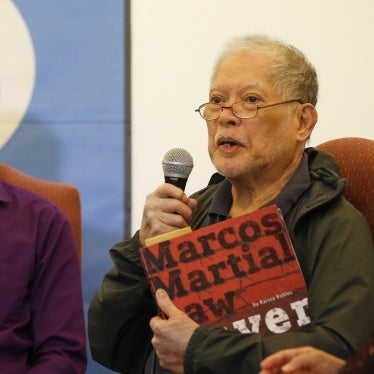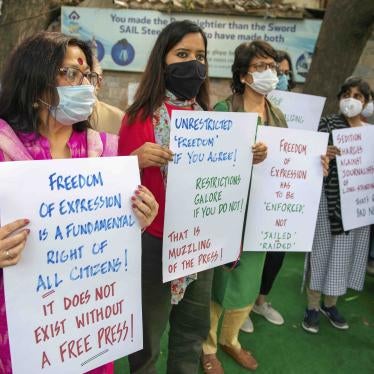His Excellency President Baron Waqa
Government of Nauru
cc: Hon. David Adeang, Minister for Justice
Hon. Lionel Aingimea, Secretary
Her Excellency Marlene Moses, Permanent Representative to the United Nations
We, the undersigned, are members of free expression and human rights organizations based in the Pacific region and around the globe. We are writing in response to the government of Nauru’s decision to block certain services on the internet and to amend the criminal code to impose new penalties on expression. On May 13, President Baron Waqa explained that the government had imposed a permanent block on sites that distribute "explicit, obscene and pornographic contents", and issued a temporary block on "other sites", including Facebook, in order to protect against abuse by malicious users.[1] The government ordered Digicel and other internet service providers on April 30 to impose the block. However, the government did not state when the temporary block would end, and the government did not claim to be responding to any immediate threats to public safety or public order.
Internet blocking and filtering is a form of censorship. Indeed, earlier this month, UN and global human rights experts reiterated that shutting down entire parts of communications systems, including the filtering of content on the internet to silence certain perspectives or voices, can never be justified under international human rights law.[2], [3]Such restrictions affect the ability of all users on Nauru to seek, receive, and impart information.
We are also deeply troubled by the amendment of the Nauru criminal code under section 244A to include a new offense for anyone who makes a statement that “coerces, intimidates, harasses, or causes emotional distress to a person” if the statement is “likely to threaten national defence, public safety, public order, public morality or public health.”[4] In penalizing such a wide variety of expression, the statute confers overbroad authority to impose jail sentences for speech without notice, chilling reporting by journalists or the media and public protest. This point was underscored by UN Special Rapporteur on freedom of opinion and expression David Kaye in his statement on Nauru on 22 May 2015.[5]
Due to this blocking, Nauru is in danger of losing valuable opportunities for economic development. The internet fosters innovation and access to knowledge, facilitates the transfer of funds, goods, and services, and provides robust social, economic, and cultural opportunities. In censoring content and obstructing the free flow of information, the government will deprive its citizens of the benefits that the internet offers. The government of Nauru’s operation of a major immigration detention center brings an additional responsibility to uphold human rights — especially given that some of the detained asylum seekers are children.
Asylum seekers are a vulnerable group that receive protections under international law. Because asylum seekers are physically detained, the internet may serve as their primary means of communication. Internet services, including Facebook and other social media, help them communicate with family in other locations, a critical issue for resettlement and for providing evidence to receive refugee status. Restrictions on access may prevent detained asylum seekers from communicating with advocates and legal representatives who are trying to help them. Asylum seekers also must have the ability to speak about the conditions of their asylum, which could be penalized under section 244A.
We therefore urge the government of Nauru to:
● Repeal the new offense related to speech under section 244A of the Criminal Code
● Restore full access to the open, global internet
● Provide an adequate remedy for the blocking of internet services, in a form of compensation to be determined in consultation with those affected
● Acknowledge the benefits of access to the open internet and explore alternative ways to promote community values
We appreciate your urgent attention to this matter and we would like to arrange a meeting at your convenience. We can be reached at deji@accessnow.org or by phone at +1 888 414 0100 x 708.
Signed,
Access, Engage Media, GetUp!, Human Rights Watch, International Service For Human Rights, Pacific
Freedom Forum, PEN International, PEN Melbourne, PEN Sydney, Refugee Council of Australia and David
Cake, Electronic Frontiers Australia.
[1] “Nauru President says Govt will protect women and children through internet blocks”, available at: http://www.naurugov.nr/government-information-office/media-release/nauru-president-says-govt-will-protect-women-and-children-through-internet-blocks.aspx
[2] “Report of the Special Rapporteur on the promotion and protection of the right to freedom of opinion and expression, Frank La Rue”, A/HRC/17/27, 16 May 2011, available at: http://www2.ohchr.org/english/bodies/hrcouncil/docs/17session/A.HRC.17.27_en.pdf, at paras 2932.
[3] Joint Declaration on Freedom of Expression and Responses to Conflict Situation, 4 May 2015, available at: http://www.article19.org/resources.php/resource/37951/en/joint-declaration-on-freedom-of-expression-and-responses-to-conflict-situation For further explanation, see also https://www.accessnow.org/blog/2015/05/04/internet-kill-switches-are-a-violation-of-human-rights-law-declare-major-un
[4] “Nauru asylum seekers could face jail for protesting conditions under new law”, The Guardian, 13 May 2015, available at: http://www.theguardian.com/world/2015/may/13/nauru-asylum-seekers-could-face-jail-for-protesting-conditions-under-new-law
[5] “UN rights expert urges Nauru to withdraw norms threatening freedom of expression”, 22 May 2015, available at: http://www.ohchr.org/EN/NewsEvents/Pages/DisplayNews.aspx?NewsID=15995&LangID=E







